MD 4044 Entrepreneurship: Bill Gates, Economy & Legal Issues
VerifiedAdded on 2023/04/21
|10
|3022
|339
Report
AI Summary
This report explores the role of entrepreneurship in building a strong economy, focusing on Bill Gates as a case study. It examines the dark side of entrepreneurship, highlighting the importance of work-life balance, health, trust, vision, money management, and scalability. The report analyzes critical decisions made by Bill Gates, such as divorcing from IBM, focusing on Windows and Office development, integrating individual apps into Office, and collaborating with Apple. It also delves into ethical challenges faced by Gates, including taking advantage of friends, copying Apple's computer program, and bundling software products. Furthermore, the report discusses legal disputes encountered by Microsoft, such as monopoly lawsuits and competition cases in South Korea and the European Union, underlining the complexities and challenges of entrepreneurship in a global context. Desklib provides students access to a wealth of solved assignments.
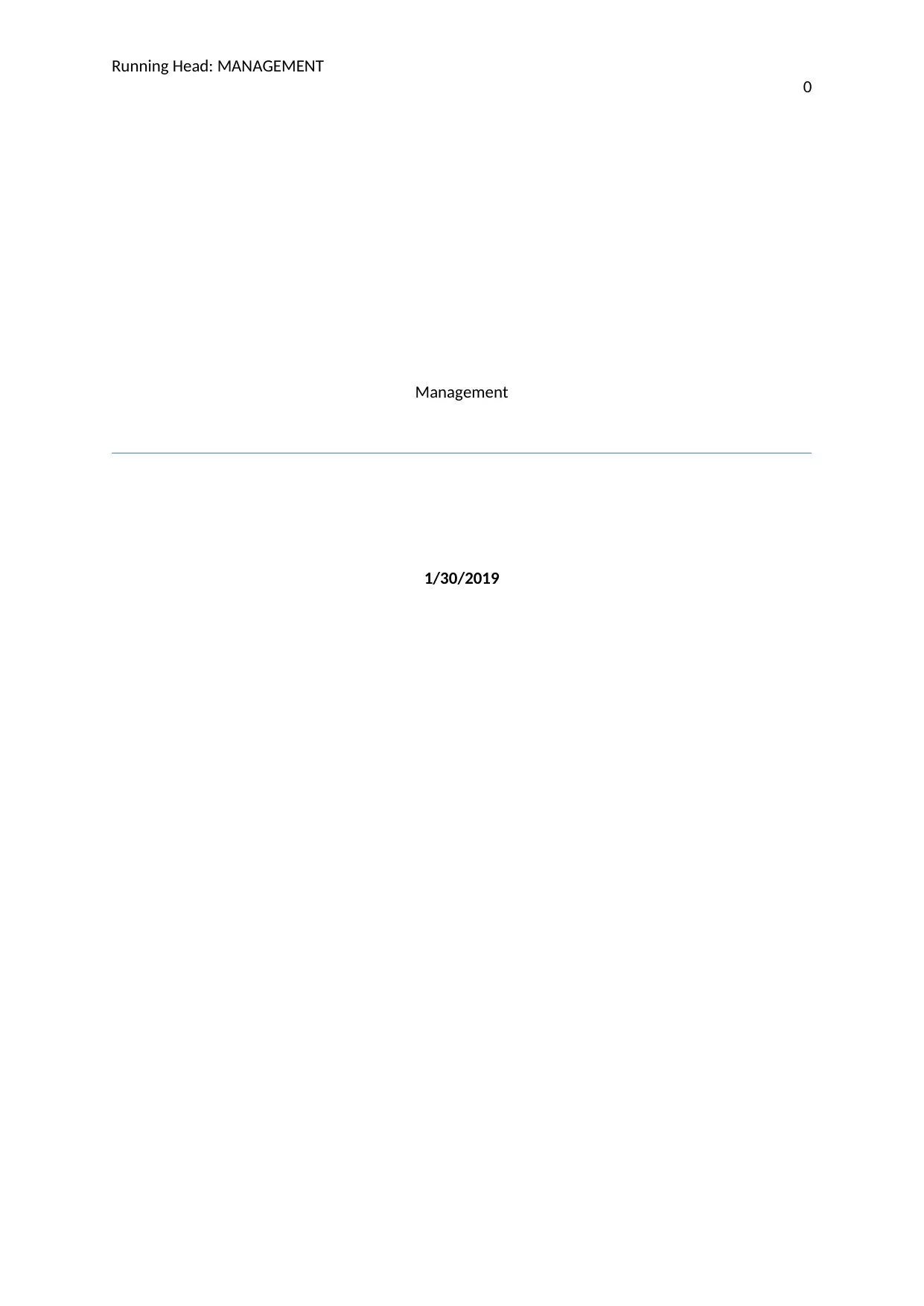
Running Head: MANAGEMENT
0
Management
1/30/2019
0
Management
1/30/2019
Paraphrase This Document
Need a fresh take? Get an instant paraphrase of this document with our AI Paraphraser
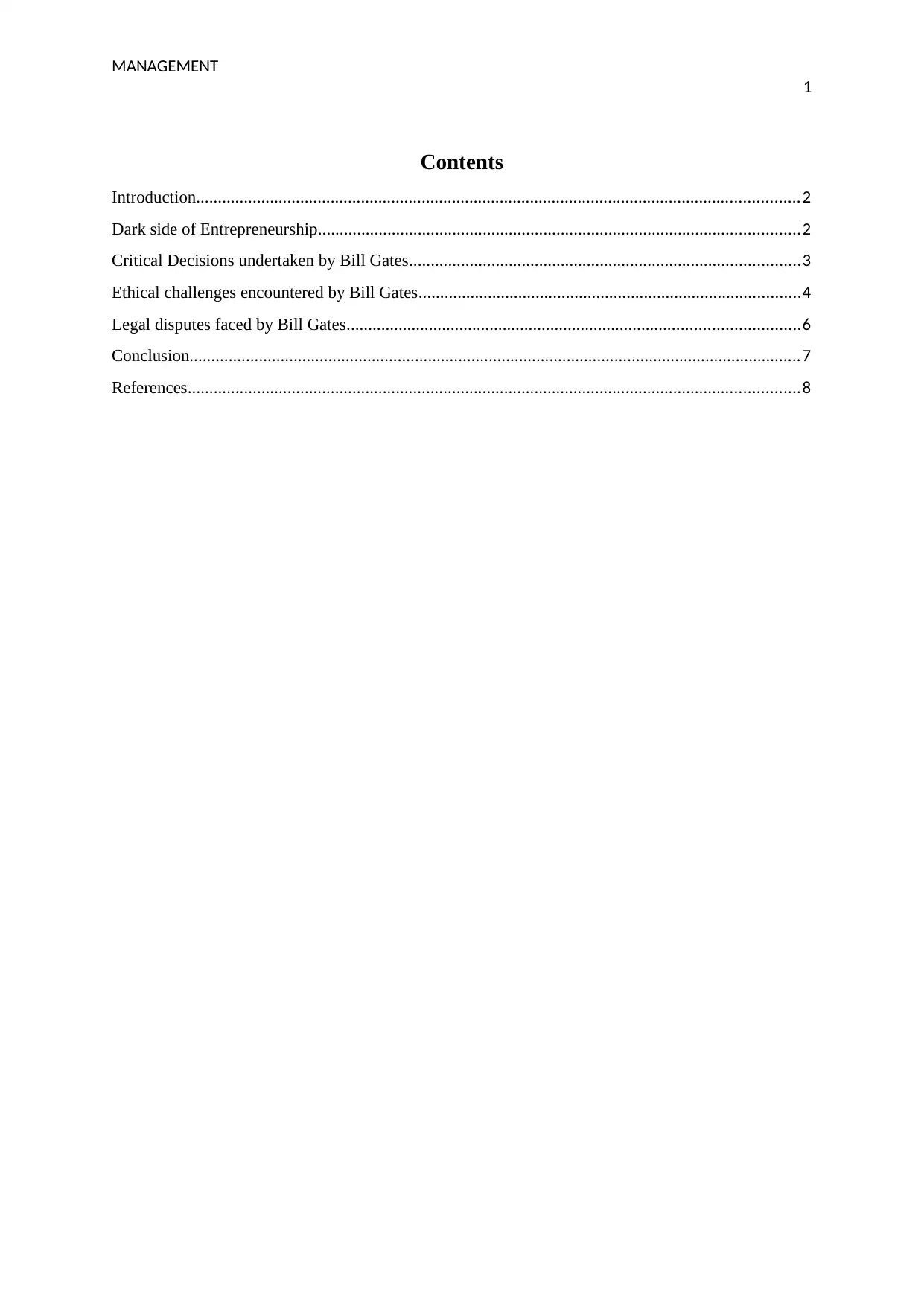
MANAGEMENT
1
Contents
Introduction...........................................................................................................................................2
Dark side of Entrepreneurship...............................................................................................................2
Critical Decisions undertaken by Bill Gates..........................................................................................3
Ethical challenges encountered by Bill Gates........................................................................................4
Legal disputes faced by Bill Gates........................................................................................................6
Conclusion.............................................................................................................................................7
References.............................................................................................................................................8
1
Contents
Introduction...........................................................................................................................................2
Dark side of Entrepreneurship...............................................................................................................2
Critical Decisions undertaken by Bill Gates..........................................................................................3
Ethical challenges encountered by Bill Gates........................................................................................4
Legal disputes faced by Bill Gates........................................................................................................6
Conclusion.............................................................................................................................................7
References.............................................................................................................................................8
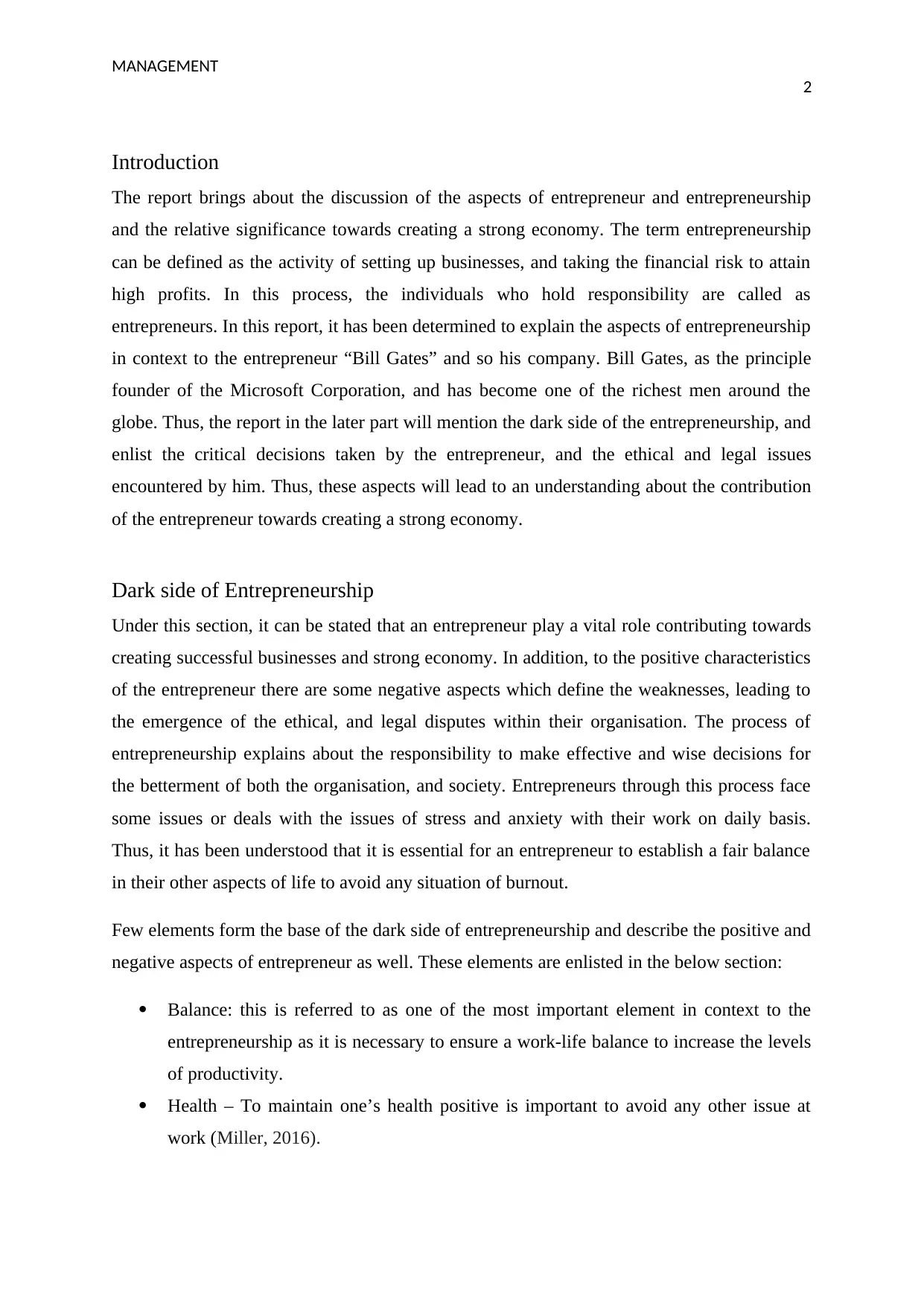
MANAGEMENT
2
Introduction
The report brings about the discussion of the aspects of entrepreneur and entrepreneurship
and the relative significance towards creating a strong economy. The term entrepreneurship
can be defined as the activity of setting up businesses, and taking the financial risk to attain
high profits. In this process, the individuals who hold responsibility are called as
entrepreneurs. In this report, it has been determined to explain the aspects of entrepreneurship
in context to the entrepreneur “Bill Gates” and so his company. Bill Gates, as the principle
founder of the Microsoft Corporation, and has become one of the richest men around the
globe. Thus, the report in the later part will mention the dark side of the entrepreneurship, and
enlist the critical decisions taken by the entrepreneur, and the ethical and legal issues
encountered by him. Thus, these aspects will lead to an understanding about the contribution
of the entrepreneur towards creating a strong economy.
Dark side of Entrepreneurship
Under this section, it can be stated that an entrepreneur play a vital role contributing towards
creating successful businesses and strong economy. In addition, to the positive characteristics
of the entrepreneur there are some negative aspects which define the weaknesses, leading to
the emergence of the ethical, and legal disputes within their organisation. The process of
entrepreneurship explains about the responsibility to make effective and wise decisions for
the betterment of both the organisation, and society. Entrepreneurs through this process face
some issues or deals with the issues of stress and anxiety with their work on daily basis.
Thus, it has been understood that it is essential for an entrepreneur to establish a fair balance
in their other aspects of life to avoid any situation of burnout.
Few elements form the base of the dark side of entrepreneurship and describe the positive and
negative aspects of entrepreneur as well. These elements are enlisted in the below section:
Balance: this is referred to as one of the most important element in context to the
entrepreneurship as it is necessary to ensure a work-life balance to increase the levels
of productivity.
Health – To maintain one’s health positive is important to avoid any other issue at
work (Miller, 2016).
2
Introduction
The report brings about the discussion of the aspects of entrepreneur and entrepreneurship
and the relative significance towards creating a strong economy. The term entrepreneurship
can be defined as the activity of setting up businesses, and taking the financial risk to attain
high profits. In this process, the individuals who hold responsibility are called as
entrepreneurs. In this report, it has been determined to explain the aspects of entrepreneurship
in context to the entrepreneur “Bill Gates” and so his company. Bill Gates, as the principle
founder of the Microsoft Corporation, and has become one of the richest men around the
globe. Thus, the report in the later part will mention the dark side of the entrepreneurship, and
enlist the critical decisions taken by the entrepreneur, and the ethical and legal issues
encountered by him. Thus, these aspects will lead to an understanding about the contribution
of the entrepreneur towards creating a strong economy.
Dark side of Entrepreneurship
Under this section, it can be stated that an entrepreneur play a vital role contributing towards
creating successful businesses and strong economy. In addition, to the positive characteristics
of the entrepreneur there are some negative aspects which define the weaknesses, leading to
the emergence of the ethical, and legal disputes within their organisation. The process of
entrepreneurship explains about the responsibility to make effective and wise decisions for
the betterment of both the organisation, and society. Entrepreneurs through this process face
some issues or deals with the issues of stress and anxiety with their work on daily basis.
Thus, it has been understood that it is essential for an entrepreneur to establish a fair balance
in their other aspects of life to avoid any situation of burnout.
Few elements form the base of the dark side of entrepreneurship and describe the positive and
negative aspects of entrepreneur as well. These elements are enlisted in the below section:
Balance: this is referred to as one of the most important element in context to the
entrepreneurship as it is necessary to ensure a work-life balance to increase the levels
of productivity.
Health – To maintain one’s health positive is important to avoid any other issue at
work (Miller, 2016).
⊘ This is a preview!⊘
Do you want full access?
Subscribe today to unlock all pages.

Trusted by 1+ million students worldwide
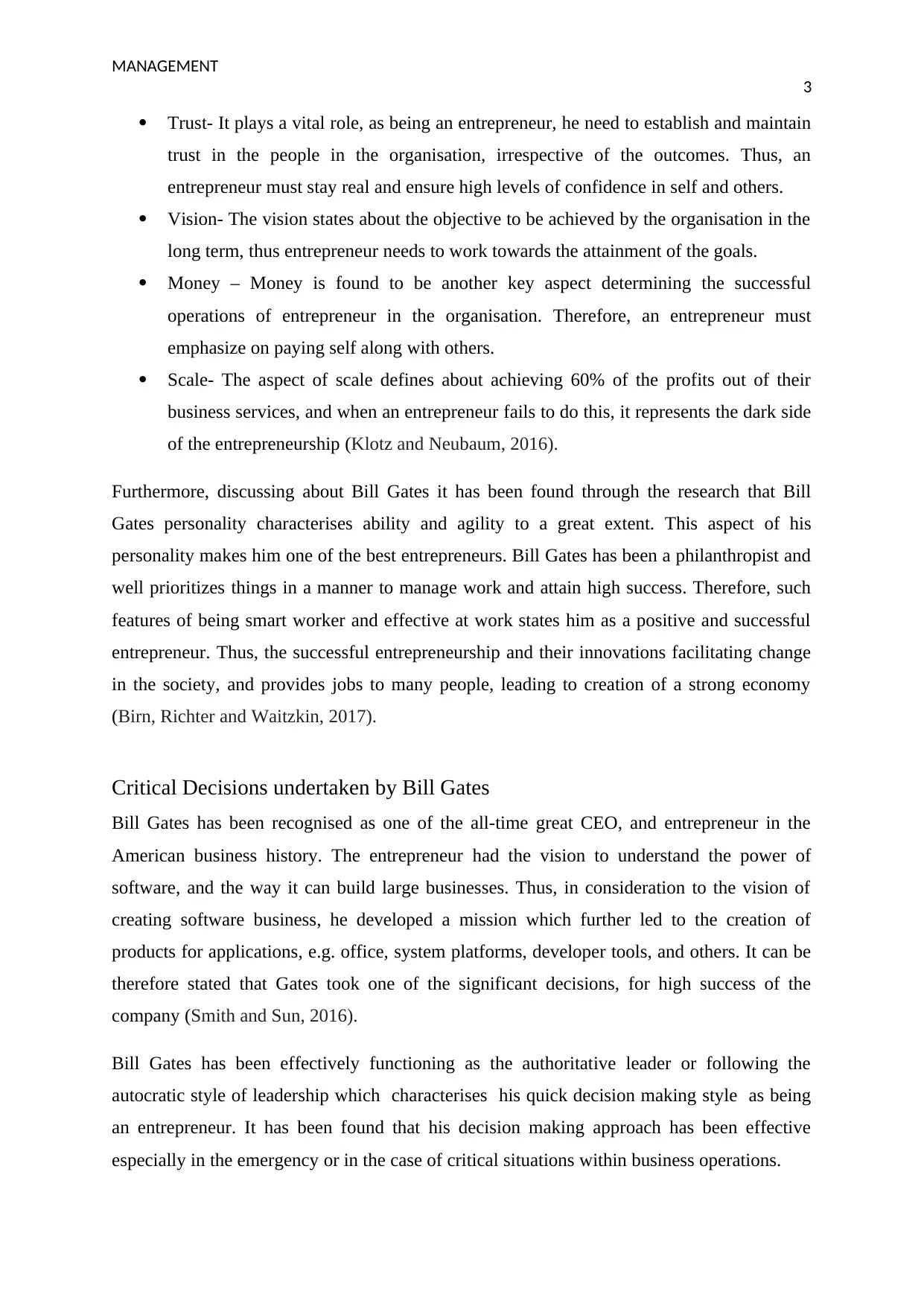
MANAGEMENT
3
Trust- It plays a vital role, as being an entrepreneur, he need to establish and maintain
trust in the people in the organisation, irrespective of the outcomes. Thus, an
entrepreneur must stay real and ensure high levels of confidence in self and others.
Vision- The vision states about the objective to be achieved by the organisation in the
long term, thus entrepreneur needs to work towards the attainment of the goals.
Money – Money is found to be another key aspect determining the successful
operations of entrepreneur in the organisation. Therefore, an entrepreneur must
emphasize on paying self along with others.
Scale- The aspect of scale defines about achieving 60% of the profits out of their
business services, and when an entrepreneur fails to do this, it represents the dark side
of the entrepreneurship (Klotz and Neubaum, 2016).
Furthermore, discussing about Bill Gates it has been found through the research that Bill
Gates personality characterises ability and agility to a great extent. This aspect of his
personality makes him one of the best entrepreneurs. Bill Gates has been a philanthropist and
well prioritizes things in a manner to manage work and attain high success. Therefore, such
features of being smart worker and effective at work states him as a positive and successful
entrepreneur. Thus, the successful entrepreneurship and their innovations facilitating change
in the society, and provides jobs to many people, leading to creation of a strong economy
(Birn, Richter and Waitzkin, 2017).
Critical Decisions undertaken by Bill Gates
Bill Gates has been recognised as one of the all-time great CEO, and entrepreneur in the
American business history. The entrepreneur had the vision to understand the power of
software, and the way it can build large businesses. Thus, in consideration to the vision of
creating software business, he developed a mission which further led to the creation of
products for applications, e.g. office, system platforms, developer tools, and others. It can be
therefore stated that Gates took one of the significant decisions, for high success of the
company (Smith and Sun, 2016).
Bill Gates has been effectively functioning as the authoritative leader or following the
autocratic style of leadership which characterises his quick decision making style as being
an entrepreneur. It has been found that his decision making approach has been effective
especially in the emergency or in the case of critical situations within business operations.
3
Trust- It plays a vital role, as being an entrepreneur, he need to establish and maintain
trust in the people in the organisation, irrespective of the outcomes. Thus, an
entrepreneur must stay real and ensure high levels of confidence in self and others.
Vision- The vision states about the objective to be achieved by the organisation in the
long term, thus entrepreneur needs to work towards the attainment of the goals.
Money – Money is found to be another key aspect determining the successful
operations of entrepreneur in the organisation. Therefore, an entrepreneur must
emphasize on paying self along with others.
Scale- The aspect of scale defines about achieving 60% of the profits out of their
business services, and when an entrepreneur fails to do this, it represents the dark side
of the entrepreneurship (Klotz and Neubaum, 2016).
Furthermore, discussing about Bill Gates it has been found through the research that Bill
Gates personality characterises ability and agility to a great extent. This aspect of his
personality makes him one of the best entrepreneurs. Bill Gates has been a philanthropist and
well prioritizes things in a manner to manage work and attain high success. Therefore, such
features of being smart worker and effective at work states him as a positive and successful
entrepreneur. Thus, the successful entrepreneurship and their innovations facilitating change
in the society, and provides jobs to many people, leading to creation of a strong economy
(Birn, Richter and Waitzkin, 2017).
Critical Decisions undertaken by Bill Gates
Bill Gates has been recognised as one of the all-time great CEO, and entrepreneur in the
American business history. The entrepreneur had the vision to understand the power of
software, and the way it can build large businesses. Thus, in consideration to the vision of
creating software business, he developed a mission which further led to the creation of
products for applications, e.g. office, system platforms, developer tools, and others. It can be
therefore stated that Gates took one of the significant decisions, for high success of the
company (Smith and Sun, 2016).
Bill Gates has been effectively functioning as the authoritative leader or following the
autocratic style of leadership which characterises his quick decision making style as being
an entrepreneur. It has been found that his decision making approach has been effective
especially in the emergency or in the case of critical situations within business operations.
Paraphrase This Document
Need a fresh take? Get an instant paraphrase of this document with our AI Paraphraser
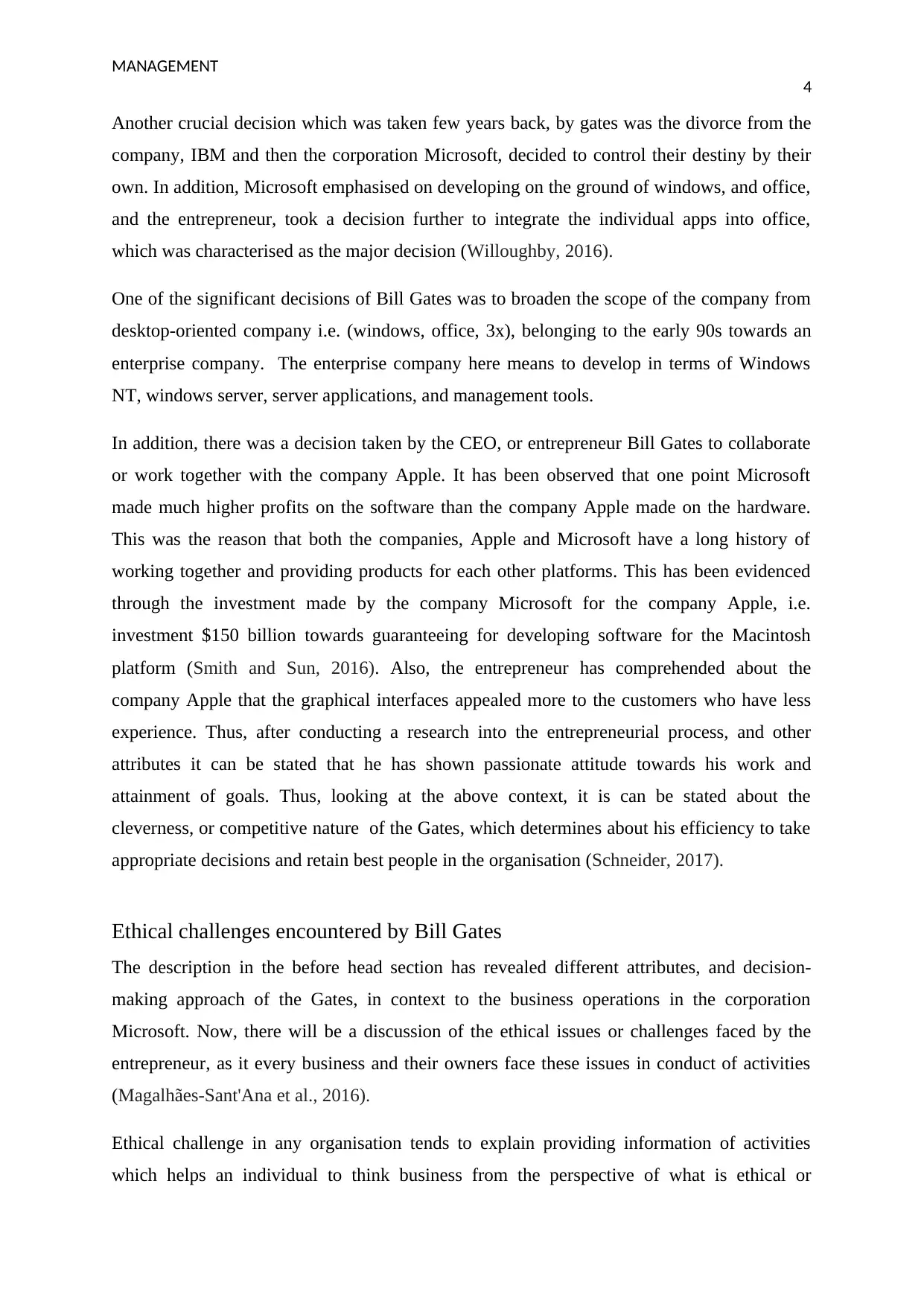
MANAGEMENT
4
Another crucial decision which was taken few years back, by gates was the divorce from the
company, IBM and then the corporation Microsoft, decided to control their destiny by their
own. In addition, Microsoft emphasised on developing on the ground of windows, and office,
and the entrepreneur, took a decision further to integrate the individual apps into office,
which was characterised as the major decision (Willoughby, 2016).
One of the significant decisions of Bill Gates was to broaden the scope of the company from
desktop-oriented company i.e. (windows, office, 3x), belonging to the early 90s towards an
enterprise company. The enterprise company here means to develop in terms of Windows
NT, windows server, server applications, and management tools.
In addition, there was a decision taken by the CEO, or entrepreneur Bill Gates to collaborate
or work together with the company Apple. It has been observed that one point Microsoft
made much higher profits on the software than the company Apple made on the hardware.
This was the reason that both the companies, Apple and Microsoft have a long history of
working together and providing products for each other platforms. This has been evidenced
through the investment made by the company Microsoft for the company Apple, i.e.
investment $150 billion towards guaranteeing for developing software for the Macintosh
platform (Smith and Sun, 2016). Also, the entrepreneur has comprehended about the
company Apple that the graphical interfaces appealed more to the customers who have less
experience. Thus, after conducting a research into the entrepreneurial process, and other
attributes it can be stated that he has shown passionate attitude towards his work and
attainment of goals. Thus, looking at the above context, it is can be stated about the
cleverness, or competitive nature of the Gates, which determines about his efficiency to take
appropriate decisions and retain best people in the organisation (Schneider, 2017).
Ethical challenges encountered by Bill Gates
The description in the before head section has revealed different attributes, and decision-
making approach of the Gates, in context to the business operations in the corporation
Microsoft. Now, there will be a discussion of the ethical issues or challenges faced by the
entrepreneur, as it every business and their owners face these issues in conduct of activities
(Magalhães-Sant'Ana et al., 2016).
Ethical challenge in any organisation tends to explain providing information of activities
which helps an individual to think business from the perspective of what is ethical or
4
Another crucial decision which was taken few years back, by gates was the divorce from the
company, IBM and then the corporation Microsoft, decided to control their destiny by their
own. In addition, Microsoft emphasised on developing on the ground of windows, and office,
and the entrepreneur, took a decision further to integrate the individual apps into office,
which was characterised as the major decision (Willoughby, 2016).
One of the significant decisions of Bill Gates was to broaden the scope of the company from
desktop-oriented company i.e. (windows, office, 3x), belonging to the early 90s towards an
enterprise company. The enterprise company here means to develop in terms of Windows
NT, windows server, server applications, and management tools.
In addition, there was a decision taken by the CEO, or entrepreneur Bill Gates to collaborate
or work together with the company Apple. It has been observed that one point Microsoft
made much higher profits on the software than the company Apple made on the hardware.
This was the reason that both the companies, Apple and Microsoft have a long history of
working together and providing products for each other platforms. This has been evidenced
through the investment made by the company Microsoft for the company Apple, i.e.
investment $150 billion towards guaranteeing for developing software for the Macintosh
platform (Smith and Sun, 2016). Also, the entrepreneur has comprehended about the
company Apple that the graphical interfaces appealed more to the customers who have less
experience. Thus, after conducting a research into the entrepreneurial process, and other
attributes it can be stated that he has shown passionate attitude towards his work and
attainment of goals. Thus, looking at the above context, it is can be stated about the
cleverness, or competitive nature of the Gates, which determines about his efficiency to take
appropriate decisions and retain best people in the organisation (Schneider, 2017).
Ethical challenges encountered by Bill Gates
The description in the before head section has revealed different attributes, and decision-
making approach of the Gates, in context to the business operations in the corporation
Microsoft. Now, there will be a discussion of the ethical issues or challenges faced by the
entrepreneur, as it every business and their owners face these issues in conduct of activities
(Magalhães-Sant'Ana et al., 2016).
Ethical challenge in any organisation tends to explain providing information of activities
which helps an individual to think business from the perspective of what is ethical or
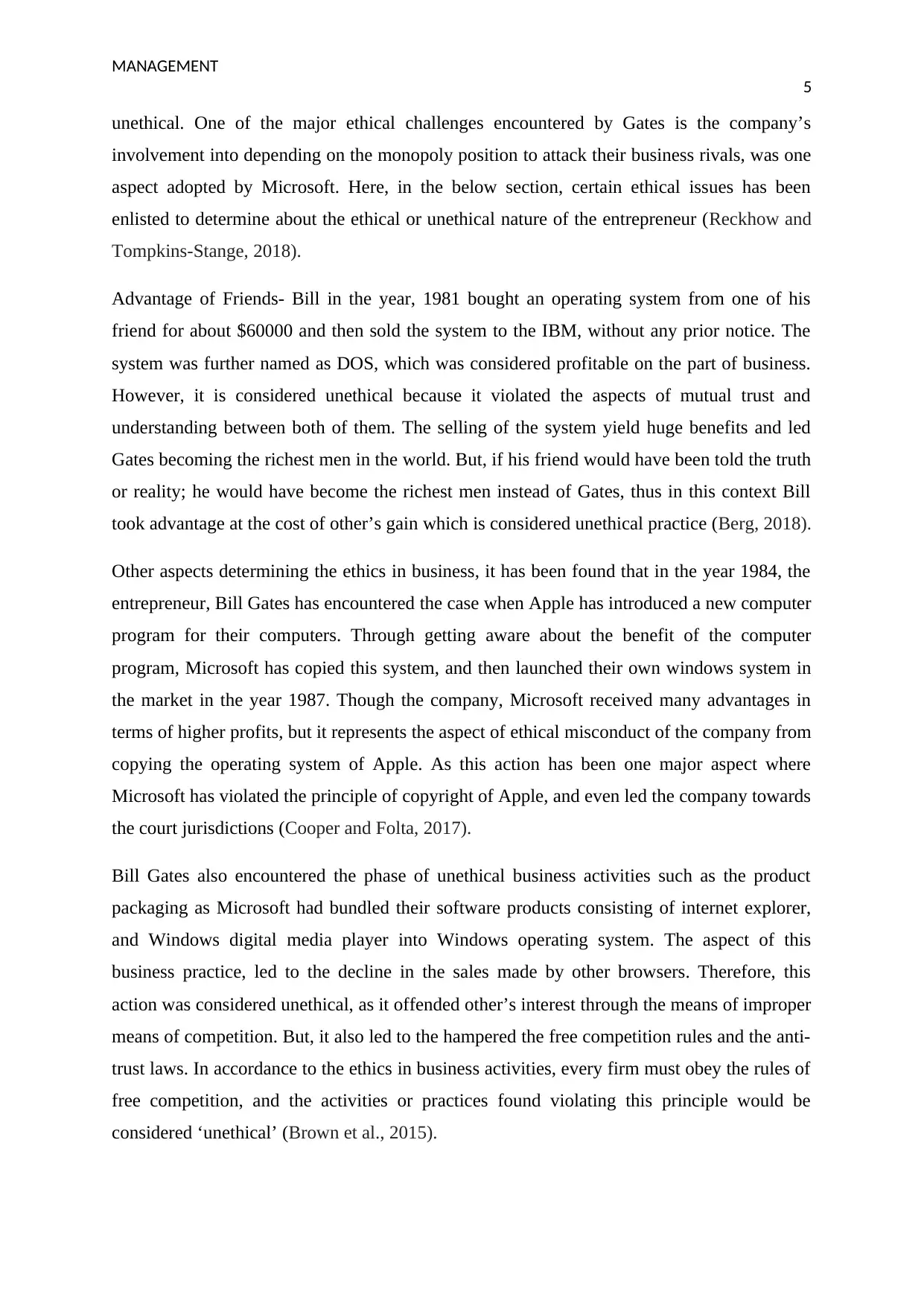
MANAGEMENT
5
unethical. One of the major ethical challenges encountered by Gates is the company’s
involvement into depending on the monopoly position to attack their business rivals, was one
aspect adopted by Microsoft. Here, in the below section, certain ethical issues has been
enlisted to determine about the ethical or unethical nature of the entrepreneur (Reckhow and
Tompkins-Stange, 2018).
Advantage of Friends- Bill in the year, 1981 bought an operating system from one of his
friend for about $60000 and then sold the system to the IBM, without any prior notice. The
system was further named as DOS, which was considered profitable on the part of business.
However, it is considered unethical because it violated the aspects of mutual trust and
understanding between both of them. The selling of the system yield huge benefits and led
Gates becoming the richest men in the world. But, if his friend would have been told the truth
or reality; he would have become the richest men instead of Gates, thus in this context Bill
took advantage at the cost of other’s gain which is considered unethical practice (Berg, 2018).
Other aspects determining the ethics in business, it has been found that in the year 1984, the
entrepreneur, Bill Gates has encountered the case when Apple has introduced a new computer
program for their computers. Through getting aware about the benefit of the computer
program, Microsoft has copied this system, and then launched their own windows system in
the market in the year 1987. Though the company, Microsoft received many advantages in
terms of higher profits, but it represents the aspect of ethical misconduct of the company from
copying the operating system of Apple. As this action has been one major aspect where
Microsoft has violated the principle of copyright of Apple, and even led the company towards
the court jurisdictions (Cooper and Folta, 2017).
Bill Gates also encountered the phase of unethical business activities such as the product
packaging as Microsoft had bundled their software products consisting of internet explorer,
and Windows digital media player into Windows operating system. The aspect of this
business practice, led to the decline in the sales made by other browsers. Therefore, this
action was considered unethical, as it offended other’s interest through the means of improper
means of competition. But, it also led to the hampered the free competition rules and the anti-
trust laws. In accordance to the ethics in business activities, every firm must obey the rules of
free competition, and the activities or practices found violating this principle would be
considered ‘unethical’ (Brown et al., 2015).
5
unethical. One of the major ethical challenges encountered by Gates is the company’s
involvement into depending on the monopoly position to attack their business rivals, was one
aspect adopted by Microsoft. Here, in the below section, certain ethical issues has been
enlisted to determine about the ethical or unethical nature of the entrepreneur (Reckhow and
Tompkins-Stange, 2018).
Advantage of Friends- Bill in the year, 1981 bought an operating system from one of his
friend for about $60000 and then sold the system to the IBM, without any prior notice. The
system was further named as DOS, which was considered profitable on the part of business.
However, it is considered unethical because it violated the aspects of mutual trust and
understanding between both of them. The selling of the system yield huge benefits and led
Gates becoming the richest men in the world. But, if his friend would have been told the truth
or reality; he would have become the richest men instead of Gates, thus in this context Bill
took advantage at the cost of other’s gain which is considered unethical practice (Berg, 2018).
Other aspects determining the ethics in business, it has been found that in the year 1984, the
entrepreneur, Bill Gates has encountered the case when Apple has introduced a new computer
program for their computers. Through getting aware about the benefit of the computer
program, Microsoft has copied this system, and then launched their own windows system in
the market in the year 1987. Though the company, Microsoft received many advantages in
terms of higher profits, but it represents the aspect of ethical misconduct of the company from
copying the operating system of Apple. As this action has been one major aspect where
Microsoft has violated the principle of copyright of Apple, and even led the company towards
the court jurisdictions (Cooper and Folta, 2017).
Bill Gates also encountered the phase of unethical business activities such as the product
packaging as Microsoft had bundled their software products consisting of internet explorer,
and Windows digital media player into Windows operating system. The aspect of this
business practice, led to the decline in the sales made by other browsers. Therefore, this
action was considered unethical, as it offended other’s interest through the means of improper
means of competition. But, it also led to the hampered the free competition rules and the anti-
trust laws. In accordance to the ethics in business activities, every firm must obey the rules of
free competition, and the activities or practices found violating this principle would be
considered ‘unethical’ (Brown et al., 2015).
⊘ This is a preview!⊘
Do you want full access?
Subscribe today to unlock all pages.

Trusted by 1+ million students worldwide
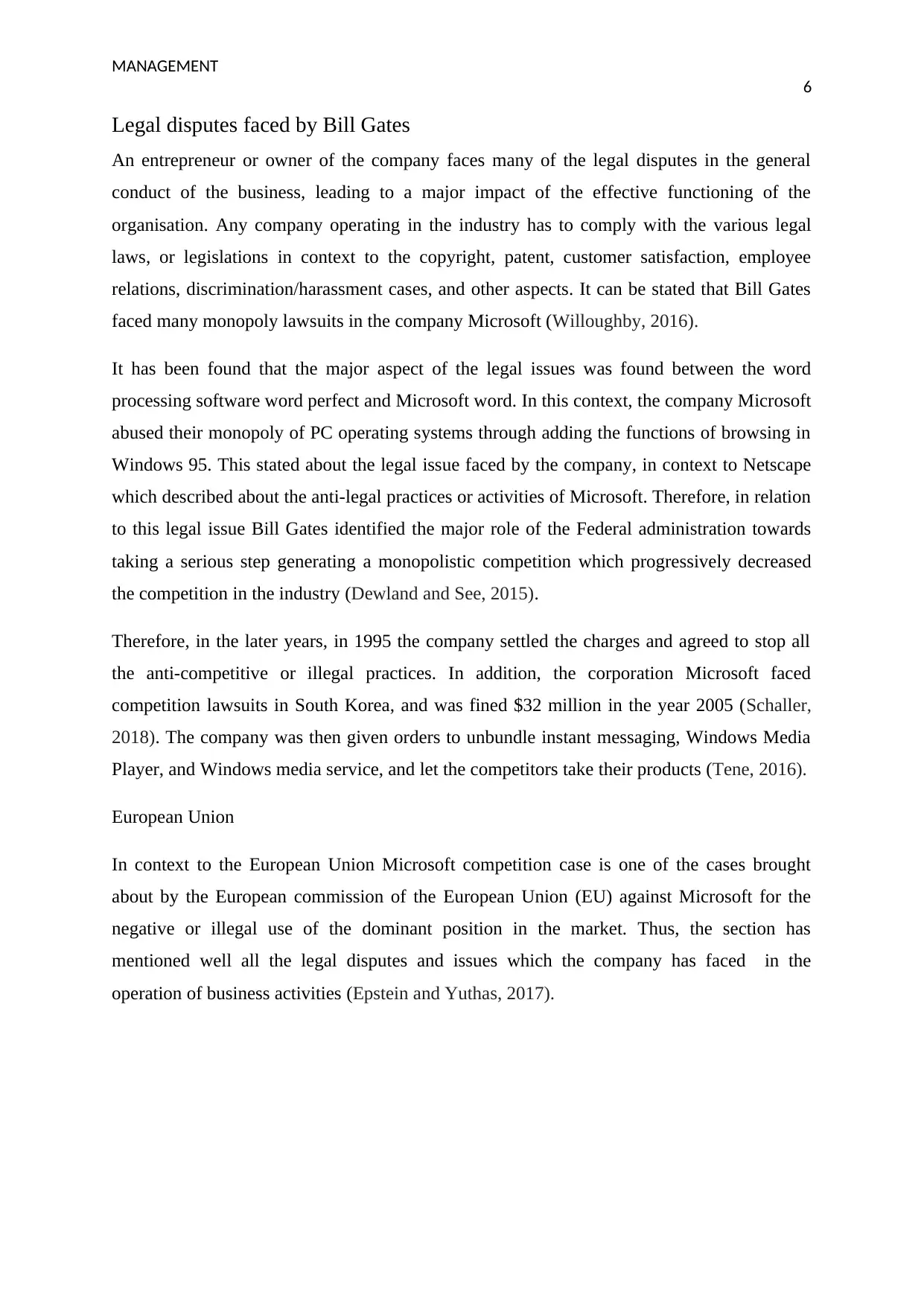
MANAGEMENT
6
Legal disputes faced by Bill Gates
An entrepreneur or owner of the company faces many of the legal disputes in the general
conduct of the business, leading to a major impact of the effective functioning of the
organisation. Any company operating in the industry has to comply with the various legal
laws, or legislations in context to the copyright, patent, customer satisfaction, employee
relations, discrimination/harassment cases, and other aspects. It can be stated that Bill Gates
faced many monopoly lawsuits in the company Microsoft (Willoughby, 2016).
It has been found that the major aspect of the legal issues was found between the word
processing software word perfect and Microsoft word. In this context, the company Microsoft
abused their monopoly of PC operating systems through adding the functions of browsing in
Windows 95. This stated about the legal issue faced by the company, in context to Netscape
which described about the anti-legal practices or activities of Microsoft. Therefore, in relation
to this legal issue Bill Gates identified the major role of the Federal administration towards
taking a serious step generating a monopolistic competition which progressively decreased
the competition in the industry (Dewland and See, 2015).
Therefore, in the later years, in 1995 the company settled the charges and agreed to stop all
the anti-competitive or illegal practices. In addition, the corporation Microsoft faced
competition lawsuits in South Korea, and was fined $32 million in the year 2005 (Schaller,
2018). The company was then given orders to unbundle instant messaging, Windows Media
Player, and Windows media service, and let the competitors take their products (Tene, 2016).
European Union
In context to the European Union Microsoft competition case is one of the cases brought
about by the European commission of the European Union (EU) against Microsoft for the
negative or illegal use of the dominant position in the market. Thus, the section has
mentioned well all the legal disputes and issues which the company has faced in the
operation of business activities (Epstein and Yuthas, 2017).
6
Legal disputes faced by Bill Gates
An entrepreneur or owner of the company faces many of the legal disputes in the general
conduct of the business, leading to a major impact of the effective functioning of the
organisation. Any company operating in the industry has to comply with the various legal
laws, or legislations in context to the copyright, patent, customer satisfaction, employee
relations, discrimination/harassment cases, and other aspects. It can be stated that Bill Gates
faced many monopoly lawsuits in the company Microsoft (Willoughby, 2016).
It has been found that the major aspect of the legal issues was found between the word
processing software word perfect and Microsoft word. In this context, the company Microsoft
abused their monopoly of PC operating systems through adding the functions of browsing in
Windows 95. This stated about the legal issue faced by the company, in context to Netscape
which described about the anti-legal practices or activities of Microsoft. Therefore, in relation
to this legal issue Bill Gates identified the major role of the Federal administration towards
taking a serious step generating a monopolistic competition which progressively decreased
the competition in the industry (Dewland and See, 2015).
Therefore, in the later years, in 1995 the company settled the charges and agreed to stop all
the anti-competitive or illegal practices. In addition, the corporation Microsoft faced
competition lawsuits in South Korea, and was fined $32 million in the year 2005 (Schaller,
2018). The company was then given orders to unbundle instant messaging, Windows Media
Player, and Windows media service, and let the competitors take their products (Tene, 2016).
European Union
In context to the European Union Microsoft competition case is one of the cases brought
about by the European commission of the European Union (EU) against Microsoft for the
negative or illegal use of the dominant position in the market. Thus, the section has
mentioned well all the legal disputes and issues which the company has faced in the
operation of business activities (Epstein and Yuthas, 2017).
Paraphrase This Document
Need a fresh take? Get an instant paraphrase of this document with our AI Paraphraser
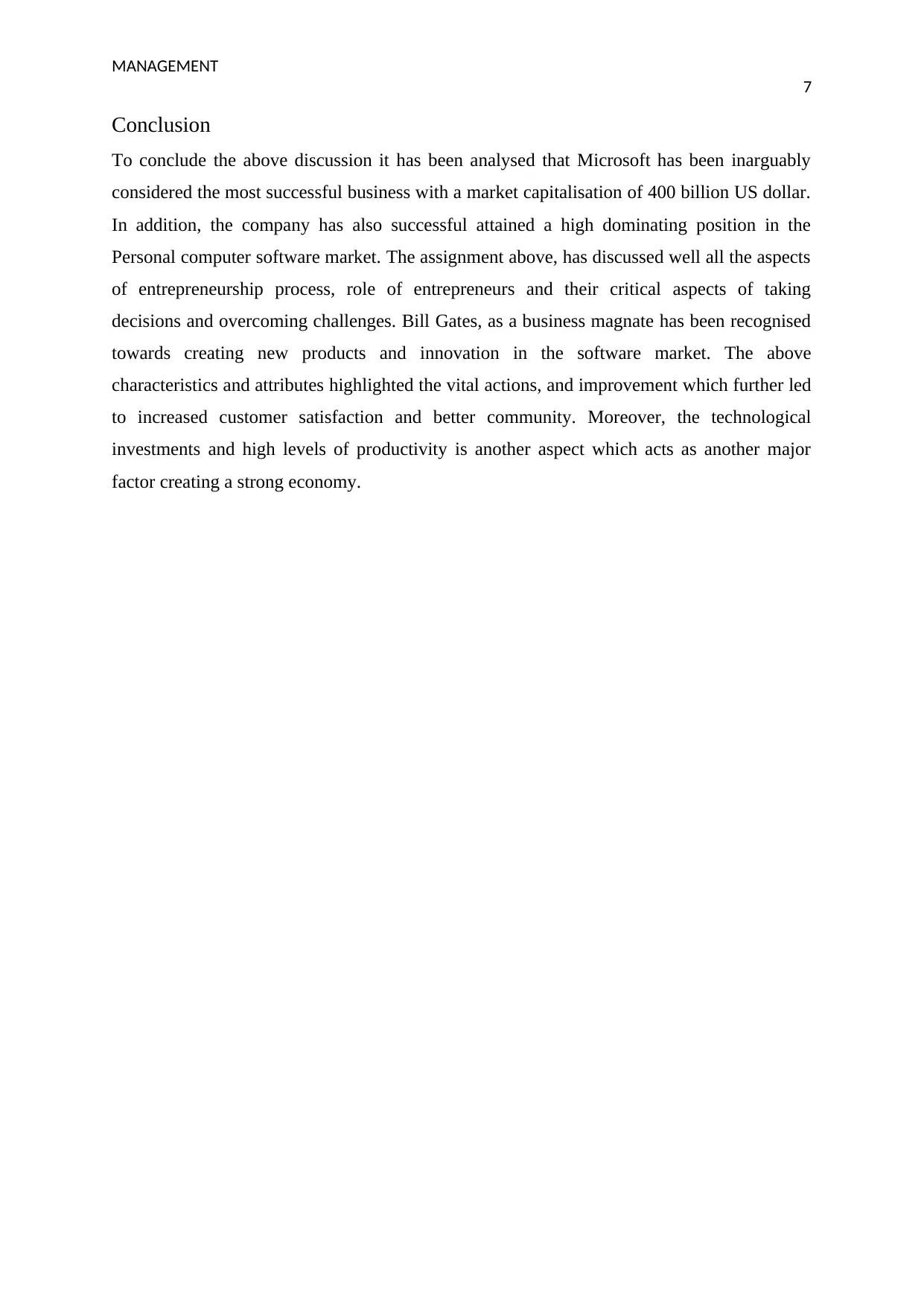
MANAGEMENT
7
Conclusion
To conclude the above discussion it has been analysed that Microsoft has been inarguably
considered the most successful business with a market capitalisation of 400 billion US dollar.
In addition, the company has also successful attained a high dominating position in the
Personal computer software market. The assignment above, has discussed well all the aspects
of entrepreneurship process, role of entrepreneurs and their critical aspects of taking
decisions and overcoming challenges. Bill Gates, as a business magnate has been recognised
towards creating new products and innovation in the software market. The above
characteristics and attributes highlighted the vital actions, and improvement which further led
to increased customer satisfaction and better community. Moreover, the technological
investments and high levels of productivity is another aspect which acts as another major
factor creating a strong economy.
7
Conclusion
To conclude the above discussion it has been analysed that Microsoft has been inarguably
considered the most successful business with a market capitalisation of 400 billion US dollar.
In addition, the company has also successful attained a high dominating position in the
Personal computer software market. The assignment above, has discussed well all the aspects
of entrepreneurship process, role of entrepreneurs and their critical aspects of taking
decisions and overcoming challenges. Bill Gates, as a business magnate has been recognised
towards creating new products and innovation in the software market. The above
characteristics and attributes highlighted the vital actions, and improvement which further led
to increased customer satisfaction and better community. Moreover, the technological
investments and high levels of productivity is another aspect which acts as another major
factor creating a strong economy.
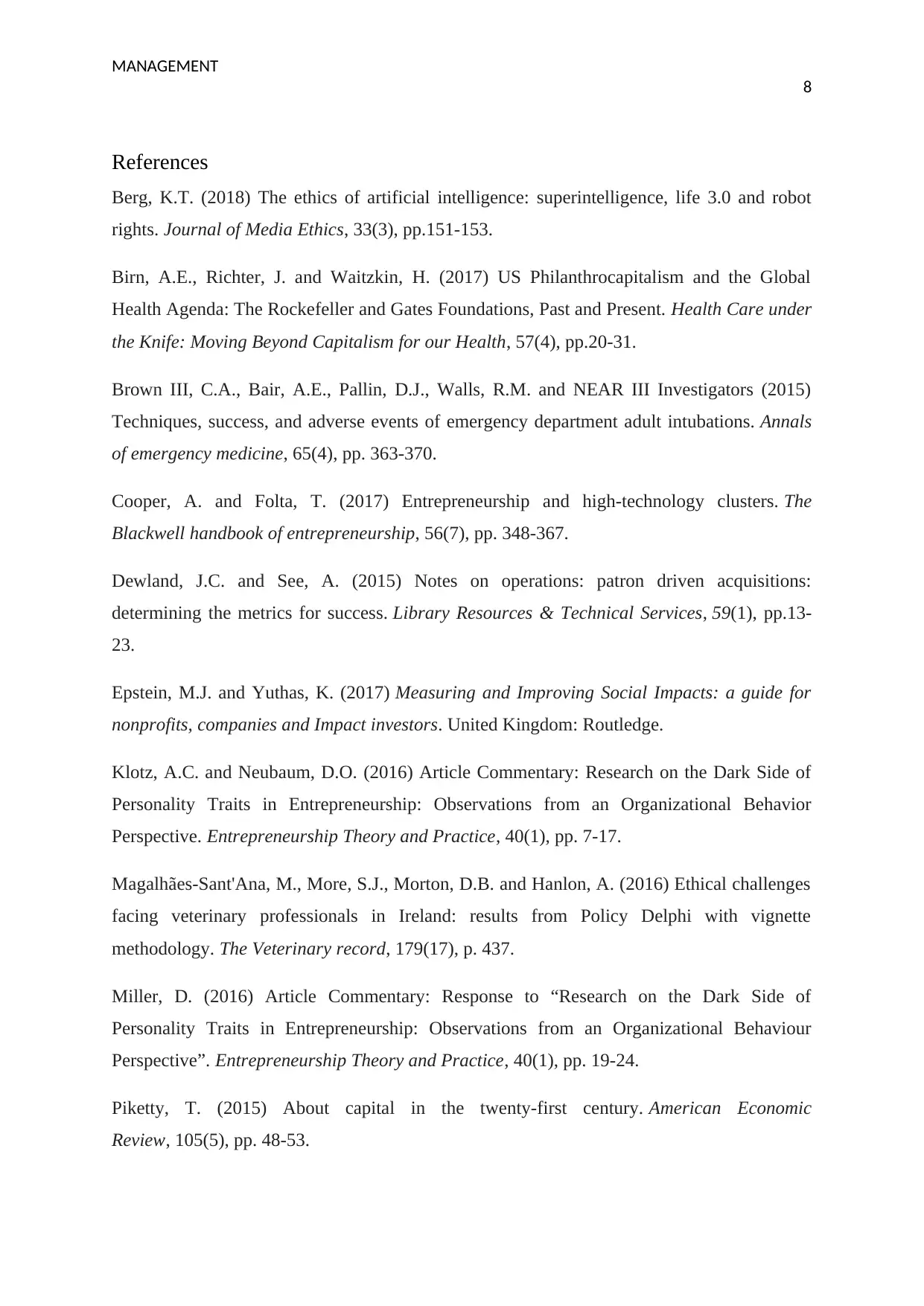
MANAGEMENT
8
References
Berg, K.T. (2018) The ethics of artificial intelligence: superintelligence, life 3.0 and robot
rights. Journal of Media Ethics, 33(3), pp.151-153.
Birn, A.E., Richter, J. and Waitzkin, H. (2017) US Philanthrocapitalism and the Global
Health Agenda: The Rockefeller and Gates Foundations, Past and Present. Health Care under
the Knife: Moving Beyond Capitalism for our Health, 57(4), pp.20-31.
Brown III, C.A., Bair, A.E., Pallin, D.J., Walls, R.M. and NEAR III Investigators (2015)
Techniques, success, and adverse events of emergency department adult intubations. Annals
of emergency medicine, 65(4), pp. 363-370.
Cooper, A. and Folta, T. (2017) Entrepreneurship and high‐technology clusters. The
Blackwell handbook of entrepreneurship, 56(7), pp. 348-367.
Dewland, J.C. and See, A. (2015) Notes on operations: patron driven acquisitions:
determining the metrics for success. Library Resources & Technical Services, 59(1), pp.13-
23.
Epstein, M.J. and Yuthas, K. (2017) Measuring and Improving Social Impacts: a guide for
nonprofits, companies and Impact investors. United Kingdom: Routledge.
Klotz, A.C. and Neubaum, D.O. (2016) Article Commentary: Research on the Dark Side of
Personality Traits in Entrepreneurship: Observations from an Organizational Behavior
Perspective. Entrepreneurship Theory and Practice, 40(1), pp. 7-17.
Magalhães-Sant'Ana, M., More, S.J., Morton, D.B. and Hanlon, A. (2016) Ethical challenges
facing veterinary professionals in Ireland: results from Policy Delphi with vignette
methodology. The Veterinary record, 179(17), p. 437.
Miller, D. (2016) Article Commentary: Response to “Research on the Dark Side of
Personality Traits in Entrepreneurship: Observations from an Organizational Behaviour
Perspective”. Entrepreneurship Theory and Practice, 40(1), pp. 19-24.
Piketty, T. (2015) About capital in the twenty-first century. American Economic
Review, 105(5), pp. 48-53.
8
References
Berg, K.T. (2018) The ethics of artificial intelligence: superintelligence, life 3.0 and robot
rights. Journal of Media Ethics, 33(3), pp.151-153.
Birn, A.E., Richter, J. and Waitzkin, H. (2017) US Philanthrocapitalism and the Global
Health Agenda: The Rockefeller and Gates Foundations, Past and Present. Health Care under
the Knife: Moving Beyond Capitalism for our Health, 57(4), pp.20-31.
Brown III, C.A., Bair, A.E., Pallin, D.J., Walls, R.M. and NEAR III Investigators (2015)
Techniques, success, and adverse events of emergency department adult intubations. Annals
of emergency medicine, 65(4), pp. 363-370.
Cooper, A. and Folta, T. (2017) Entrepreneurship and high‐technology clusters. The
Blackwell handbook of entrepreneurship, 56(7), pp. 348-367.
Dewland, J.C. and See, A. (2015) Notes on operations: patron driven acquisitions:
determining the metrics for success. Library Resources & Technical Services, 59(1), pp.13-
23.
Epstein, M.J. and Yuthas, K. (2017) Measuring and Improving Social Impacts: a guide for
nonprofits, companies and Impact investors. United Kingdom: Routledge.
Klotz, A.C. and Neubaum, D.O. (2016) Article Commentary: Research on the Dark Side of
Personality Traits in Entrepreneurship: Observations from an Organizational Behavior
Perspective. Entrepreneurship Theory and Practice, 40(1), pp. 7-17.
Magalhães-Sant'Ana, M., More, S.J., Morton, D.B. and Hanlon, A. (2016) Ethical challenges
facing veterinary professionals in Ireland: results from Policy Delphi with vignette
methodology. The Veterinary record, 179(17), p. 437.
Miller, D. (2016) Article Commentary: Response to “Research on the Dark Side of
Personality Traits in Entrepreneurship: Observations from an Organizational Behaviour
Perspective”. Entrepreneurship Theory and Practice, 40(1), pp. 19-24.
Piketty, T. (2015) About capital in the twenty-first century. American Economic
Review, 105(5), pp. 48-53.
⊘ This is a preview!⊘
Do you want full access?
Subscribe today to unlock all pages.

Trusted by 1+ million students worldwide
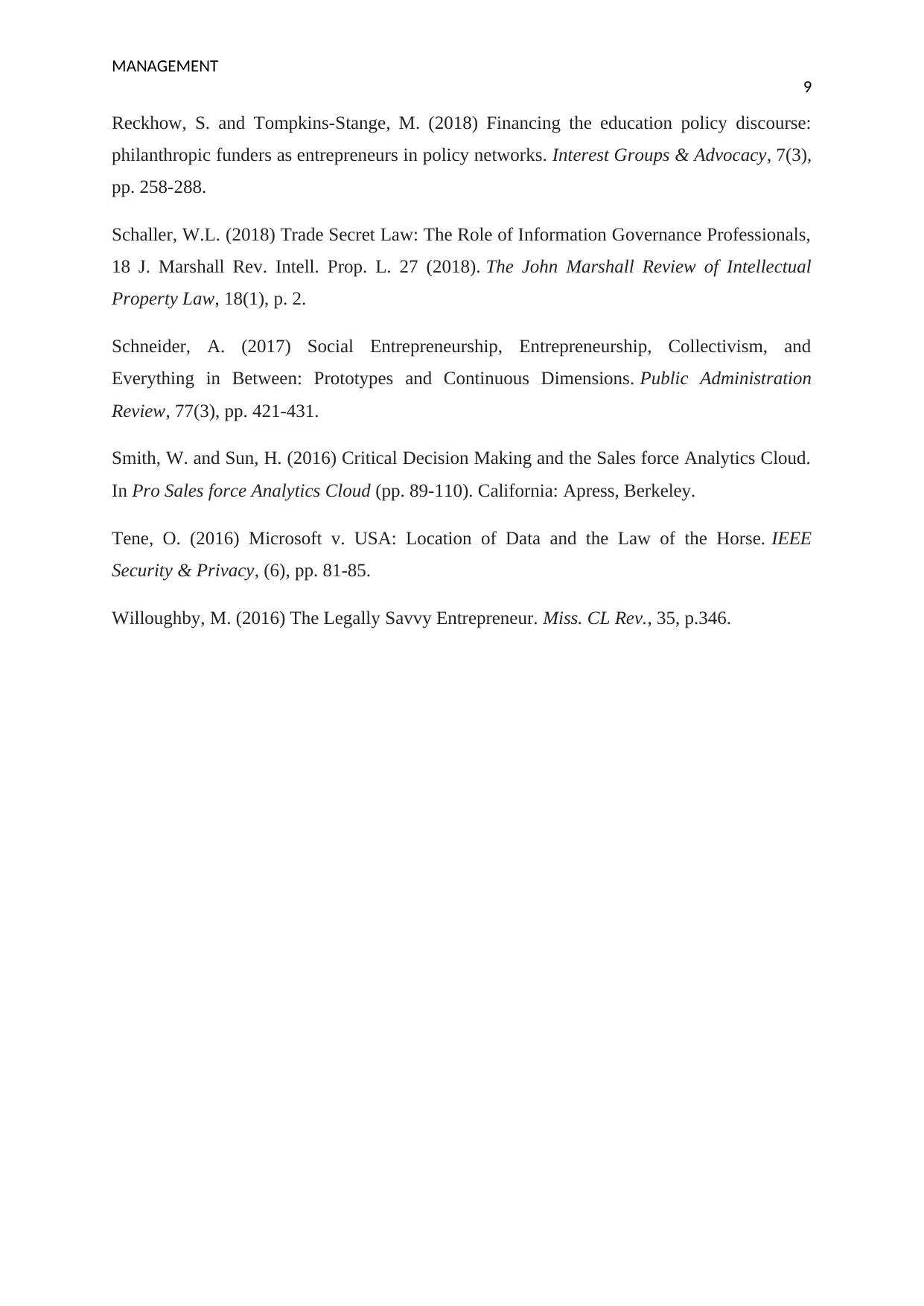
MANAGEMENT
9
Reckhow, S. and Tompkins-Stange, M. (2018) Financing the education policy discourse:
philanthropic funders as entrepreneurs in policy networks. Interest Groups & Advocacy, 7(3),
pp. 258-288.
Schaller, W.L. (2018) Trade Secret Law: The Role of Information Governance Professionals,
18 J. Marshall Rev. Intell. Prop. L. 27 (2018). The John Marshall Review of Intellectual
Property Law, 18(1), p. 2.
Schneider, A. (2017) Social Entrepreneurship, Entrepreneurship, Collectivism, and
Everything in Between: Prototypes and Continuous Dimensions. Public Administration
Review, 77(3), pp. 421-431.
Smith, W. and Sun, H. (2016) Critical Decision Making and the Sales force Analytics Cloud.
In Pro Sales force Analytics Cloud (pp. 89-110). California: Apress, Berkeley.
Tene, O. (2016) Microsoft v. USA: Location of Data and the Law of the Horse. IEEE
Security & Privacy, (6), pp. 81-85.
Willoughby, M. (2016) The Legally Savvy Entrepreneur. Miss. CL Rev., 35, p.346.
9
Reckhow, S. and Tompkins-Stange, M. (2018) Financing the education policy discourse:
philanthropic funders as entrepreneurs in policy networks. Interest Groups & Advocacy, 7(3),
pp. 258-288.
Schaller, W.L. (2018) Trade Secret Law: The Role of Information Governance Professionals,
18 J. Marshall Rev. Intell. Prop. L. 27 (2018). The John Marshall Review of Intellectual
Property Law, 18(1), p. 2.
Schneider, A. (2017) Social Entrepreneurship, Entrepreneurship, Collectivism, and
Everything in Between: Prototypes and Continuous Dimensions. Public Administration
Review, 77(3), pp. 421-431.
Smith, W. and Sun, H. (2016) Critical Decision Making and the Sales force Analytics Cloud.
In Pro Sales force Analytics Cloud (pp. 89-110). California: Apress, Berkeley.
Tene, O. (2016) Microsoft v. USA: Location of Data and the Law of the Horse. IEEE
Security & Privacy, (6), pp. 81-85.
Willoughby, M. (2016) The Legally Savvy Entrepreneur. Miss. CL Rev., 35, p.346.
1 out of 10
Your All-in-One AI-Powered Toolkit for Academic Success.
+13062052269
info@desklib.com
Available 24*7 on WhatsApp / Email
![[object Object]](/_next/static/media/star-bottom.7253800d.svg)
Unlock your academic potential
Copyright © 2020–2026 A2Z Services. All Rights Reserved. Developed and managed by ZUCOL.


